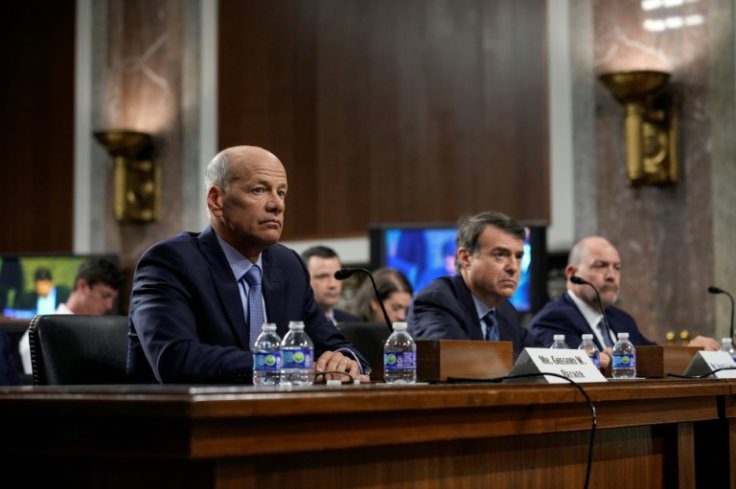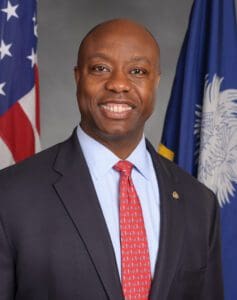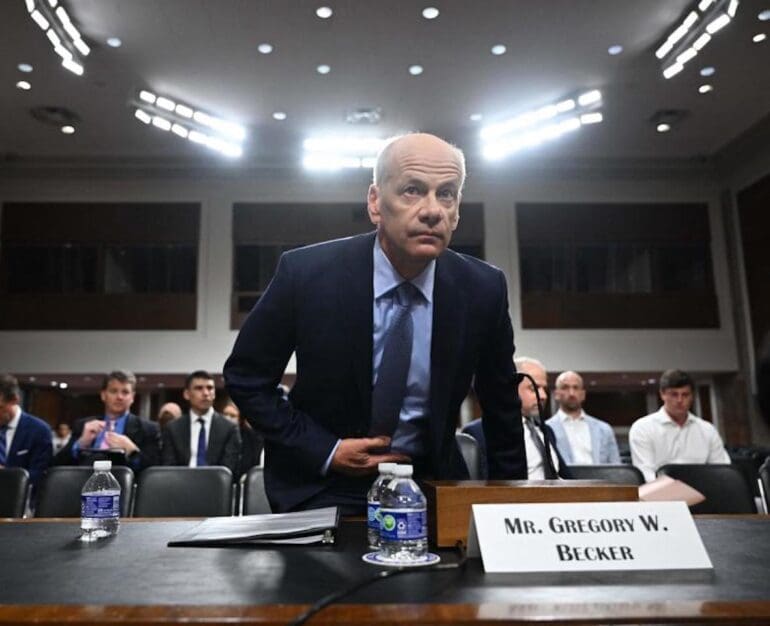In a weekend that shook the U.S. banking system, Silicon Vally Bank (SVB) experienced the fastest bank failure in history, taking down a series of other banks with it and spinning the startup community into chaos, and the dust hasn’t settled.
Now assured to be stable, the banking system continues to question how such a failure could have happened in so little time. Yesterday, May 16, 2023, for the first time since the bank’s collapse, ex-CEO of SVB, Gregory Becker, flanked by two of Signature Bank’s top executives, took to the stand in a hearing that many hoped would shed light on the crisis.
Related:
A tale of SVB as told by Becker
In his written testimony, released ahead of the hearing, Becker outlined the skyrocketing growth of SVB in 2020 and 2021.
Fuelled by the government’s stimulus methods to respond to the COVID-19 pandemic, he highlighted that extremely low rates had benefitted banks across the country, leading to an additional $5 trillion of deposits in U.S. commercial banks.
At SVB, growth of 10% between 2015 and 2019 catapulted to 63% in 2020, increasing the bank’s value from $71 billion in assets to $112 billion. In 2021, the bank continued to grow, now at a rate of 83% to $212 billion.
“Like any bank,” he wrote, SVB invested the new rash of deposits in investment securities by making new loans. He said that SVB’s Asset Liability Management Committee (“ALCO”), of which he was “not a member” but trusted implicitly, made a series of investments during this time in “low-risk, highly rated government-backed securities. He called these securities “safe” and available as collateral if the bank needed liquidity.
Notably, he stated that these moves had been made in a low-rate environment that the Federal Reserve had communicated would remain stable, and any inflation remained “transitory.”
Likening SVB’s actions to those of many other banks during this time, he highlighted that “between the start of 2020 and the end of 2021, banks collectively purchased nearly $2.3 trillion of investment securities in this low-yield environment created by the Federal Reserve.”
The testimony maintained that SVB implemented risk procedures matching the bank’s unprecedented growth, taking steps to improve liquidity. Becker also pointed out that the Federal Reserve’s supervisory team had awarded the bank the second-highest rating for liquidity, capital, and market risk in August 2022.
While Becker concluded with an apology, he did not fail to pin significant blame on the rapid rate rises and social media for the resulting bank run.
“I never imagined that these unprecedented events could happen to SVB and strongly believe that the leadership team and I made the best decisions we could with the facts, forecasts, and outside expert advice available to us at the time,” he wrote. “We made these decisions in good faith and the best interests of SVB, its employees, and its clients.”
In the subsequent hearing, when asked to identify any of his own mistakes, Becker could not answer with one.

A committee of skeptics
“It sounds a lot like ‘my dog ate my homework,'” said Senator Sherrod Brown, Democrat of Ohio, during the hearing.
To say it lightly, the Senate Banking Committee was not convinced.
“I am shocked at the complete negligence and disregard for the economic realities that this country was facing,” continued Brown. “It seems like big losses and a struggling stock price motivated management to jump-start profits and boost the stock price. In doing so, you didn’t seem to care about increasing obvious risks.”
He questioned Becker’s testimony and his failure to include that the business had run without a Chief Compliance Officer for over a year. Brown also pointed out SVB had only tried to “fix things” when management was warned the bank faced a downgrade.

Still, Becker, Scott Shay, Co-Founder of Signature Bank, and Eric Howell, its President, maintained that they “took risk management seriously,” a statement that sparked incredulity among the Committee.
“It is hard to believe that comment as it relates to the uniqueness of your bank,” said Senator Tim Scott. “When your bank is such an anomaly in an industry where 90% of your deposits were uninsured, how did you see that risk and then not respond to it?”
“As a $50 billion bank, you don’t have to worry about the stress test. When you hit $200 billion, you should be constantly aware of what a stress test looks like and how you pass that test. It is hard for me to appreciate that you are taking risk seriously when, in fact, the anomaly itself should’ve triggered a different type of stress test in your own mind.”
Warnings of supervisory issues
Senator Elizabeth Warren underscored SVB’s avoidance of the Fed’s warnings regarding their risk management.
“Your bank had issues with capital planning. It had issues with liquidity risk management. And the bulk of the issues identified by the Fed focused on weak governance,” she said. “It was a litany of management failures. By the time SVB failed…it had 31 unresolved supervisory issues.”
She also brought the Committee’s attention to Becker’s lobbying efforts to relax Dodd-Frank legislation that would have submitted the bank to stress tests — considered a pivotal factor in SVB’s risk management. She stated that the same year the requested changes had been passed, Becker received a 35% pay bump, despite 17 federal warnings.

“Instead of paying attention to warnings, Mr. Becker, Mr. Shay, and Mr. Howell took on more risks to boost their paychecks,” she said.
Her attention turned to the loss incurred by the bank’s failure on the FDIC fund, which she stated amounted to around $20 billion. She noted that the total amount would have to be repaid, likely to be the burden of several stakeholders in the banking ecosystem.
“How much of the 40 million dollars you earned from loading up SVB bank with risk are you planning to return to the FDIC?” Warren asked. “Are you planning to return a single nickel to what you cost the fund?”
After seemingly endless moments of squirming from Becker, who said he was aware of a future review process for compensation, she concluded, “I’ll take that as a no.”
The compensation review process will be underway over the following weeks. Warren has introduced an additional bill to “make it slightly less profitable for bank CEOs to blow up the banking system.”
However, with all 31 unresolved supervisory issues, which almost doubled four years after the bank’s collapse, the jury is still out on why regulators didn’t step in sooner.


